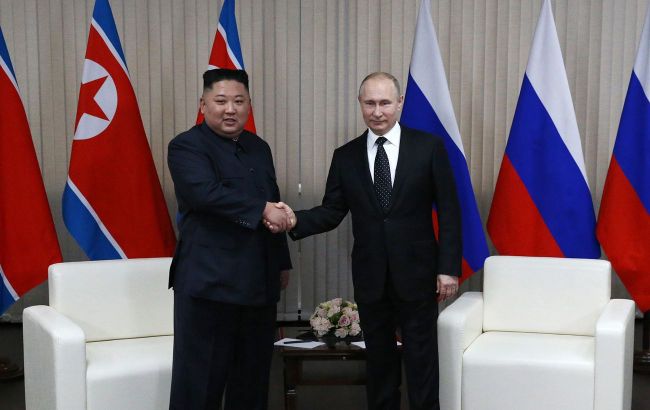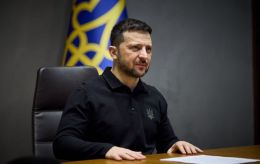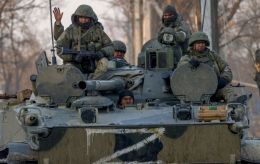West concerned over deepening Russia-North Korea ties ahead of Putin's visit
 Photo: North Korean leader Kim Jong Un and Russian dictator Vladimir Putin (Getty Images)
Photo: North Korean leader Kim Jong Un and Russian dictator Vladimir Putin (Getty Images)
The United States and South Korea are concerned about the potential deepening of military cooperation between Russia and North Korea in the context of the planned visit of Russian dictator Vladimir Putin to Pyongyang, reports Reuters.
Officials from the United States and South Korea have expressed concern about the establishment of a new level of cooperation between the dictatorial regimes.
South Korea's Deputy Foreign Minister Kim Hong-kyun held an urgent phone conversation with US Deputy Secretary of State Kurt Campbell. During the dialogue, Kim stated that Putin's visit should not lead to an enhancement of military cooperation between Pyongyang and Moscow, violating UN Security Council resolutions.
Sharing the concerns of South Korea's foreign minister, Campbell promised to continue cooperation to overcome potential regional instability and challenges that this trip might cause.
"While closely monitoring related developments, the two sides agreed to resolutely respond through airtight cooperation to North Korea's provocations against South Korea and actions that escalate tensions in the region," stated South Korea's Ministry of Foreign Affairs.
On Wednesday, June 12, a high-ranking official in the South Korean president's administration stated that Putin would visit North Korea "in the coming days." The Russian newspaper Vedomosti reported that the dictator would visit North Korea and Vietnam "in the coming weeks."
Kremlin spokesman Dmitry Peskov refused to name the date or agenda of the potential visit. Instead, he stated that Russia's right to develop closer ties with North Korea should not cause anyone doubt or concern.
North Korea's Deputy Foreign Minister Kim Son Gyong, speaking in state media, accused Washington of a "serious political provocation aimed at tarnishing" North Korea's image. This reaction came in response to a UN Security Council meeting held this week on the human rights situation in North Korea.
Partnership gains momentum
Officials in Washington, Seoul, and Kyiv, as well as independent experts and UN sanctions observers, have reported that Russia has used North Korean-made missiles and artillery shells to attack targets in Ukraine.
North Korea and Russia deny any arms supply agreements but have vowed to deepen cooperation in all areas, including military relations.
Speaking at the Stimson Center in Washington on Wednesday, Kurt Campbell said the United States is well aware of what North Korea has provided to Russia, which he said has had a "significant impact on the battlefield."
At the same time, he noted that it is not entirely clear what Russia has given North Korea in return.
"Hard currency? Is it energy? Is it capabilities that allow them to advance their nuclear or missile products? We don't know. But we're concerned by that and watching carefully," he said.
In her March testimony before Congress, US Director of National Intelligence Avril Haines stated that the need for support in the war against Ukraine has led Russia to make some "long-sought concessions" to North Korea, as well as to China and Iran, with the potential to undermine, among other things, long-established nuclear nonproliferation norms.
Haines did not elaborate on her statement, but the reference to the easing of nonproliferation norms appeared to be a warning that Moscow might provide Pyongyang with military-related technologies.
"This growing cooperation and willingness to exchange aid in military, economic, political, and intelligence matters enhances their individual capabilities, assists them to undermine the rules-based order, and gives them some insulation from international pressure," she said.
At the same time, US intelligence estimates that relations between Russia and North Korea will remain "far" from a formal alliance, as narrow partisan interests and mutual distrust are likely to limit their cooperation.
Russia's cooperation with North Korea
Recently, South Korean Defense Minister Shin Won Sik stated that North Korea sent containers to Russia that could hold about 5 million artillery shells. During his visit to Pyongyang, Putin is likely to request even more ammunition.
According to the US State Department, since September 2023, North Korea has supplied Moscow with over 10,000 containers of ammunition or materials related to ammunition.
Vadym Skibitsky, a representative of the Defense Intelligence of Ukraine, stated that North Korea has transferred 1.5 million artillery shells to Moscow.
In December of last year, the White House reported that Russia purchased ballistic missiles from North Korea. The aggressor has already used them for strikes on Ukraine.

